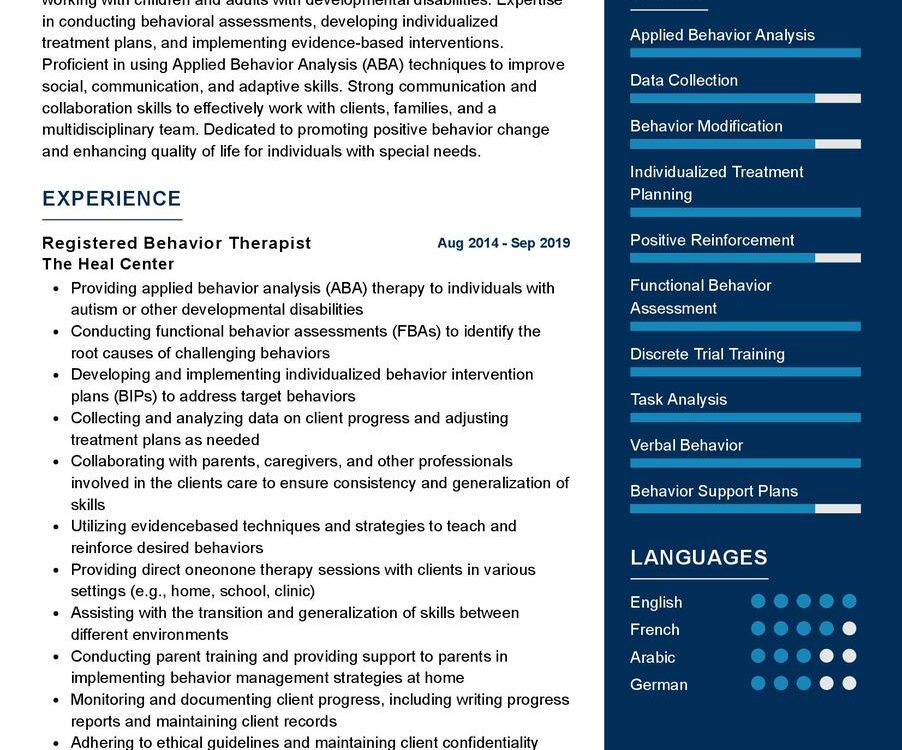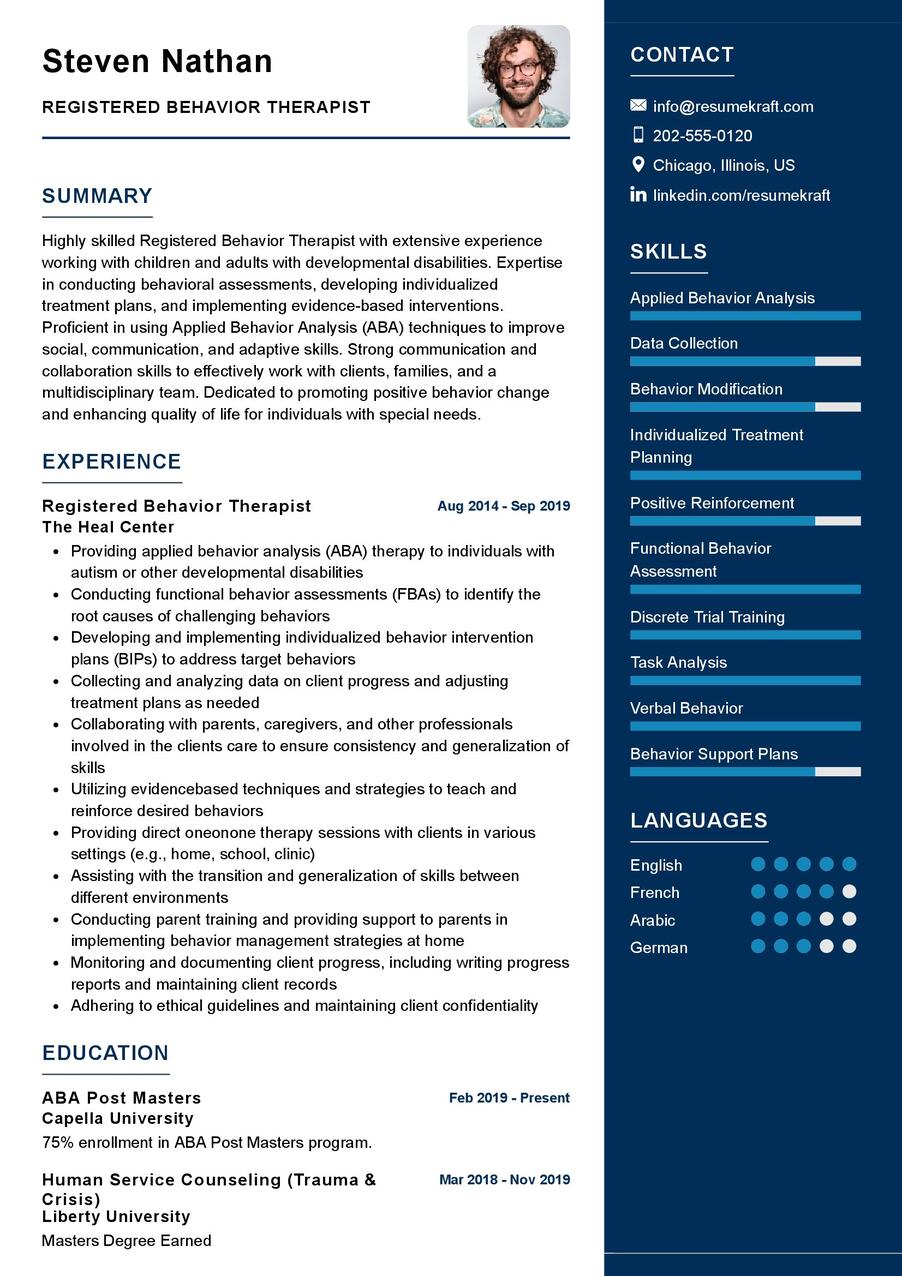Exploring the Role of a Registered Behavior Therapist
In today’s dynamic healthcare landscape, the role of a Registered Behavior Therapist (RBT) holds immense significance. As professionals dedicated to improving the lives of individuals with behavioral challenges, RBTs play a crucial role in the field of Applied Behavior Analysis (ABA). Let’s delve into the multifaceted responsibilities and requirements that define the journey of a Registered Behavior Therapist.
Understanding the Job Requirements for a Registered Behavior Therapist
Becoming a Registered Behavior Therapist involves meeting specific criteria and showcasing a unique set of skills. The path to becoming an RBT is a rewarding journey that requires dedication and a commitment to making a positive impact. Here are the key requirements for aspiring Registered Behavior Therapists:
- A Bachelor’s degree in Psychology, Education, or a related field, laying the foundation for a deep understanding of human behavior.
- Completion of a 40-hour training program in Applied Behavior Analysis (ABA), a crucial step in mastering the principles and techniques of ABA therapy.
- Supervised fieldwork experience, where individuals can apply ABA principles in real-world settings under the guidance of experienced professionals.
- Passing the RBT Competency Assessment, a comprehensive evaluation of the therapist’s skills and knowledge in implementing ABA interventions.
- Strong interpersonal and communication skills, essential for building rapport with clients and collaborating with a multidisciplinary team.
- Compliance with the ethical standards set by the Behavior Analyst Certification Board (BACB), ensuring the highest level of professionalism in practice.
Securing additional certifications in specialized areas of ABA can enhance an RBT’s profile and open doors to diverse opportunities in the field.
Roles and Responsibilities of a Registered Behavior Therapist
The role of a Registered Behavior Therapist extends beyond implementing behavior interventions; it involves a holistic approach to improving the lives of individuals with developmental challenges. Let’s explore the diverse responsibilities that define the daily routine of an RBT:
- Conducting functional behavior assessments to identify the underlying causes of challenging behaviors.
- Developing and implementing individualized behavior intervention plans (BIPs) tailored to each client’s unique needs and goals.
- Providing direct, one-on-one ABA therapy sessions to clients, focusing on skill acquisition and behavior reduction.
- Collecting and analyzing data to track the progress of clients, making data-driven decisions to adjust intervention strategies as needed.
- Collaborating with families, caregivers, and other healthcare professionals to create a cohesive support system for clients.
- Participating in team meetings and case reviews to ensure a comprehensive and coordinated approach to client care.
- Staying abreast of the latest research and best practices in ABA to continuously enhance therapeutic techniques and interventions.
Each responsibility is a testament to the RBT’s dedication to fostering positive change and improving the quality of life for individuals with behavioral challenges.
Crafting a Standout CV for a Registered Behavior Therapist Position
Your CV is a crucial tool in showcasing your qualifications, skills, and experiences as a Registered Behavior Therapist. Here are some tips to create a compelling CV that stands out in the competitive job market:
- Highlight your educational background, emphasizing relevant coursework and training in ABA principles.
- Detail your hands-on experience in conducting functional behavior assessments and implementing behavior intervention plans.
- Showcase your proficiency in data collection and analysis, illustrating your ability to make informed decisions based on client progress.
- Include any additional certifications or training programs related to specialized areas of ABA, demonstrating your commitment to professional development.
- Use clear and concise language, focusing on quantifiable achievements and the positive outcomes of your interventions.
- Personalize your CV for each application, aligning your skills and experiences with the specific requirements of the job.
Your CV is your professional narrative, an opportunity to demonstrate your expertise and passion for making a difference in the field of Applied Behavior Analysis.
Interview Tips for Aspiring Registered Behavior Therapists
Preparing for a job interview as a Registered Behavior Therapist requires a strategic approach to highlight your skills and suitability for the position. Here are some key tips to excel in your RBT job interview:
- Be prepared to discuss specific cases or experiences where you successfully implemented behavior intervention plans and saw positive outcomes.
- Demonstrate your understanding of ethical considerations in ABA therapy and your commitment to upholding professional standards.
- Highlight your collaboration skills by discussing instances where you worked effectively with families, caregivers, and other members of a multidisciplinary team.
- Showcase your flexibility and adaptability in adjusting intervention strategies based on client progress and evolving needs.
- Express your passion for ongoing learning and professional development, emphasizing any additional certifications or training you have pursued.
Remember, the interview is an opportunity to not only showcase your qualifications but also to convey your genuine commitment to making a positive impact in the lives of those you serve.
Key Takeaways for Your Registered Behavior Therapist CV
As you craft your CV and prepare for job interviews as a Registered Behavior Therapist, keep these key takeaways in mind:
- Emphasize your unique qualifications, including educational background, hands-on experience, and any specialized certifications.
- Showcase your commitment to ethical practice and ongoing professional development in the field of Applied Behavior Analysis.
- Use your CV as a personalized narrative, aligning your skills and experiences with the specific requirements of each job application.
- During interviews, highlight specific examples that demonstrate your effectiveness in implementing ABA interventions and collaborating with clients and their support networks.
Finally, feel free to utilize resources like AI CV Builder, CV Design, CV Samples, CV Examples, CV Skills, CV Help, CV Synonyms, and Job Responsibilities to create a standout application and prepare for the [Registered Behavior Therapist] job interview.
Armed with these insights and tips, you are now ready to craft a CV that is a true reflection of your journey, your skills, and your aspirations. Remember, your CV is not just a document; it is a canvas where you paint your career story, a story of growth, learning, and impact. Best of luck!


